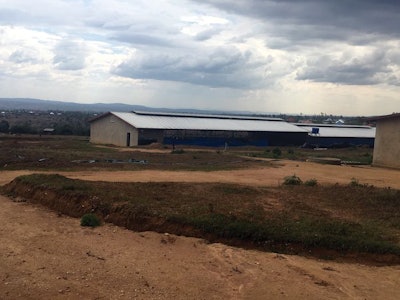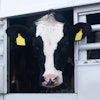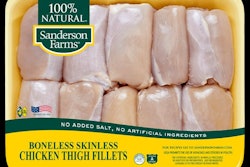
Imagine starting a broiler farm from scratch, on land where every hectare was owned by a different family, and each family member had to agree to the purchase before selling to you - not the easiest way to start a business.
Now imagine achieving a 65% local market share within five years of starting production. Again, not an easy feat to achieve.
This has been achieved by Poultry East Africa Ltd. (PEAL), since founder, Singapore-based Shumei Lam, made the decision to start broiler production back in 2012.

PEAL founder, Shumei Lam, started the farm to help increase local supplies of meat and help the population. (Mark Clements)
From deciding to enter the broiler business to seeing the first birds on the farm took two years, but was it worth it?
For Lam, there were personal reasons for going into business locally (located 45 minutes from the Rwandan capital Kigali). Doing so was a way of continuing the work of her late father who was one of the first major investors in the country and to address the need for meat locally; the decision appears to be paying dividends.
The 10-hectare, 50,000 bird capacity farm comprises a 5-ton per hour feed mill, a hatchery, 4 curtain-walled broiler houses, and a processing plant with an 800-bird an hour processing line and cold storage. The facilities are hazard analysis and critical control points (HACCP) certified and Halal certified, and the company also owns three cold trucks and employs 100 people.
In addition to rearing birds on-site since 2016, PEAL has also been working with 25 contract farmers, supplying training, chicks, feed and veterinary attention as needed. It has proved to be a successful relationship and 60% of production is now contracted out.
Commenting on the contracting relationship, Lam said, “Our farmers must be up to scratch, and they must live on their farm.”
She continued that the company is open to working with more small-scale producers, helping them to benefit from the economic scale of being part of a larger group, as long as they adhere to the PEAL’s standards.
As part of the contract relationship, not only standards, but also production targets are set. If these are exceeded, bonuses are awarded.
Market orientation
PEAL raises Ross 308 birds to 42 to 45 days and a slaughter weight of 5.7-6.1 pounds. The company hatches its own chicks, 50% of which serve its own needs directly, 30% go to a major client, while the remaining 20% are sold to local farmers.
Its own multi-age flocks are kept on locally sourced, rice husk bedding which is then sold on as fertilizer and any used water or other waste is returned to the land. Waste from the processing plant goes to a pig farm.
The business is in cuts of 50%, and supplies airlines, hotels and supermarkets. Kigali is the main destination for product, where the company accounts for 75% of the market, while nationwide, 50% of chicken meat sold comes from PEAL chickens. The company can supply up to 10,000 chickens a week and slaughters to demand.
PEAL chicken is instantly recognizable, as the company is the only poultry producer in Rwanda to sell its product in branded packing. This not only ensures product stand-out but is part of the company’s traceability program. PEAL is currently the only company in the country to offer a program like such for its products.
Issues to overcome
While PEAL may now be up and successfully running, with plans for further expansion, reaching this point has not been easy and difficulties continue to present themselves.
The Rwandan poultry market is typified by boom and bust, with great price volatility. When prices rise, more are tempted to enter the market, but a lack of enforced legislation means that new entrants do not necessarily do the best possible job, and their actions can have implications for producers across the market. Until the sector becomes more formalized, this type or problem is expected to continue.
This is not the only issue, there are also more day to day problems to solve. There is 24-hour security on farm with dogs to prevent theft.
Water had to be brought on site and supplies remain limited. Looking more widely, security of supply can hinder the business. For example, for 2 years obtaining soy was problematic. While this may have resolved, now difficulties have arisen in securing maize supplies.
Imports are expensive and transport can also be an issue with containers being held in port.
Supply side issues are not the only difficulties for any poultry producer operating in the country. The average Rwandan still consumes meat on a less-than-weekly basis and most do not have refrigerators at home. Additionally, chicken meat is more expensive than beef or goat meat.
While the local climate may be ideal for raising broilers, there are numerous migratory birds and being 1,700 meters above sea level means that a percentage of fertilized eggs will not hatch because they came from breeder flocks that are kept at sea level. While the farm may have up to date equipment and trained and engaged staff, having all of its units on one site is not ideal. How to change this is being examined.
Looking to the future
Commenting on the future, Lam said, “This started as an impact investment to help people, but it exceeded expectations and now we want to ramp up the business.” PEAL has an immediate goal of tripling production and a target of processing 30,000 broilers per week.
It also wants to produce its own hatching eggs which are currently imported from Turkey. That would mean establishing its own breeding flock on site where there is plenty of space for expansion.
There are also plans to establish an export division with the Congo and Uganda being the first export markets to be targeted, notes managing director Neal Roper, who lives on site.

Managing director, Neal Roper, explained that the tight controls governing the farm have allowed the business to develop the way it was anticipated and will provide the opportunity for it to move forward in whatever way may be the best direction. (Mark Clements)
He continued that Rwanda was once a dumping ground for Ugandan chicken, but that Rwandan production is now cheaper and, with a processing plant operating to international standards, PEAL’s product should be attractive in the neighboring market.
As the first, modern, integrated poultry producer in Rwanda, PEAL looks well placed to take advantage of this situation.

PEAL raises Ross 308 birds to an age of 42 to 45 days and has become the main supplier of broiler meat both locally and nationally. (Mark Clements)


















